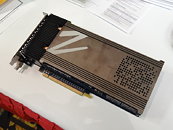Monday, January 9th 2012

OCZ R4 PCIe SSD Packs 16 SandForce SF-2200 Series Subunits
No, it's not a fancy graphics card by OCZ that's pictured below, don't let the PCI-Express x16 interface and cooling assembly with vents and heat pipes sticking out fool you. This monstrosity is OCZ's R4, a complex PCI-Express solid-state drive (SSD) which packs 16 (!) SSD subunits, each driven by a SandForce SF-2200 controller. Each of the subunits is part of a very large RAID array, which is abstract to the host machine. The host only sees the cumulative capacity into a single volume.
At the heart of the beast is a spanking new VCA 2.0 processor, which provides each of those subunits a SATA 6 Gb/s link, and connects to the host over PCI-Express 2.0 x16. The sequential transfer speed of the R4 is up to 6,656 MB/s (megabytes per second). It will be offered in various capacities, 3.2 TB looks like a possible capacity option.
Source:
PCPerspective
At the heart of the beast is a spanking new VCA 2.0 processor, which provides each of those subunits a SATA 6 Gb/s link, and connects to the host over PCI-Express 2.0 x16. The sequential transfer speed of the R4 is up to 6,656 MB/s (megabytes per second). It will be offered in various capacities, 3.2 TB looks like a possible capacity option.

16 Comments on OCZ R4 PCIe SSD Packs 16 SandForce SF-2200 Series Subunits
Speeds are indeed insane, but with 16 controllers, you're just calling for a failure. Just look how many SF drives die for no reason and they only have 1 controller. With 16, it's 16x more likely to go wrong :(
1x Kidney
1x House
1x Car
Half height version
300GB, 600GB, 1.2TB versions
Up to 2GB/s
Idle 14.5W, Active (hard to read)
Full height version
800GB, 1.6TB, 3.2TB
Up to 2.8GB/s
Up to 500,000 IOPs
Idle 23W, Active (hard to read)
This is clearly equipment for very specialist applications... and not an archive drive... but a drive where important data will be backed up to more reliable media.
Great for a workstation. OS drive and working drive. HDD for essential data, copied for processing.
en.wikipedia.org/wiki/List_of_device_bandwidths#Random_Access_Memory